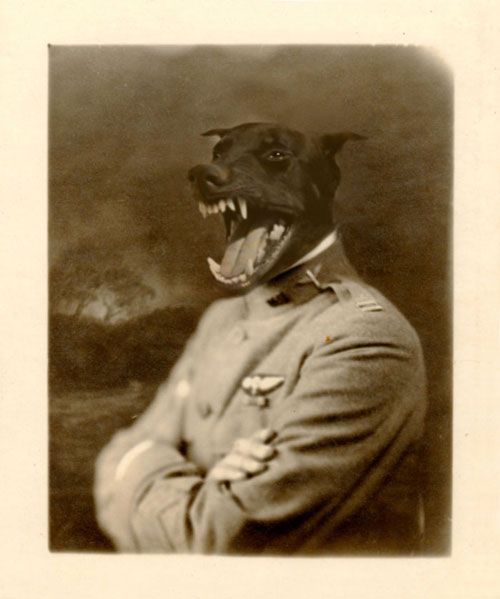
My earliest memory of my father is terribly sentimental—it is of his lifting me gently from the ground after my fall from a swing. I must have been three. I fell flat on my face on the hard bare dirt, and father ran to me and cradled me in his arms and made jokes and funny faces until I forgot about my pain.
...
No, I am not saying that my father was a kind and decent man before the uniform, only that he was kind and decent at that moment. That he was capable of kindness and decency.
...
If memory serves, he found it at a swap meet in the basement of the senior center. We had been walking past the place, he and I and my mother, and we peered down through the basement windows and saw the sale going on. And so we went in.
...
No, we had never done anything like this before. I don't know what made us do it.
...
I suppose you could say that. But I don't happen to believe in fate, myself. At any rate. My father found the uniform almost immediately, and then we paid and left. I remember that, once he had it in his hands, our work at the swap meet was done—it was as if it was our reason for going. He said that he would wear it that Halloween, as a costume. But he didn't.
...
No, I don't mean that. I mean that, by that time, he was wearing it regularly. It was not a costume, I mean—it was merely a uniform. It was his uniform. So that when he wore it on Halloween, he was merely wearing it. In fact, I think he put on something else for the evening, a sheet perhaps. I don't remember.
...
The accent began about a week before Thanksgiving. I don't know in what context he used it first, but the first I heard it was when he ordered me to put my wagon back into the barn before a rain began. I had been going to do it, but he demanded that I do it immediately. Commanded. He commanded me, in his German accent.
...
I have no idea if it was authentic. It sounded that way to me, but I was a child. My experience of the accent was that of hearing American and British actors imitate it in movies. My father likely had heard the real thing in the Army. In any event it was very convincing. Almost immediately he began to issue commands regularly, using the accent. Things my mother already did without being asked, such as cleaning or preparing meals, he now ordered her to do, and stood over her while she did them.
...
Five months, I believe—he had been unemployed for five months at this point.
...
Thank you. By Christmas, then, he had gotten into the habit of issuing orders to everyone, at all times. And he began to strike us if we disobeyed, and sometimes even if we did not. And I should mention at this point that my mother was pregnant as well, about five months pregnant. And he had begun to bellow at the fetus as well. He would lean over as my mother worked and scream at her belly, which had lately begun to show.
...
No, my mother did not bring it up with me. We did not discuss it.
...
Well, what would you have had us do? We were terrified. And this was an era during which it meant something to be the man of the house. The sixties had not yet happened. My mother was, on the surface, a very conventional woman.
...
Christmas morning. He began to strike us on Christmas morning. Me, specifically, when I failed to register adequate gratitude for a particular gift. I do not remember what it was. And from then on, he struck us at every available opportunity, under the slightest pretense. This went on consistently until my mother miscarried.
...
No, I was at school. I do remember, however, being picked up from school by my aunt and uncle and brought to the hospital to see her. Her appearance was devastating. Her skin had gone pale, causing the bruises to stand out in sharp relief. And my aunt informed me that my sister would not be born. I didn't understand why this was, at the time—it did not occur to me that a fetus could die in utero. My father, meanwhile, had gone missing, and it would be another day and a half before I would discover him in the barn. My aunt is still alive and still regrets having allowed me to go out there, but I blame her for nothing. I wanted to play, the barn was where I did it. It should have been healthy for me to go there. He had hung himself from the basketball hoop. It was like a parody of the gymnasium at Nuremberg. The note pinned to his chest could be read from where I stood, by the door: MIT REUE, regretfully.
...
Of course it affected my work. Everything one experiences affects his work. This interview will affect my work.
...
Well, by preventing me from doing it, for one thing.
...
No, I would not call my buildings harsh or cruel. I would call them real. They are works of realism. Their relationship to human beings is immaterial. Have you gotten enough?
...
Thank you. When the article is published, please send me a copy for my files.